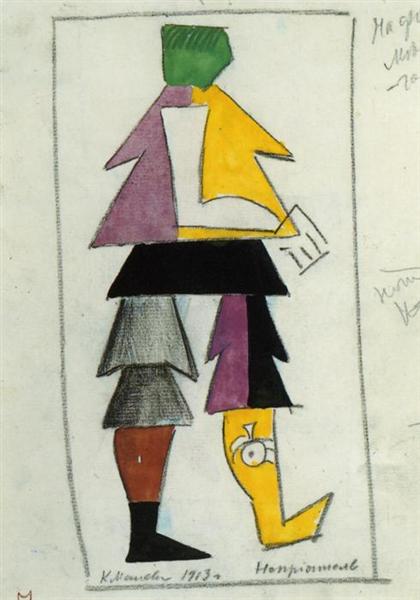Description
Enemy - 1913 (Enemy - 1913) by Kazimir Malevich is an emblematic work that encapsulates the stylistic transition of the artist to more abstract and geometric forms, a preamble of his subsequent development of suprematism. When observing this painting, one goes into a universe where the figures and forms merge into a challenging balance and a composition that is intriguing halfway between Cubism and futurism.
The composition of enemy - 1913 is based on a dynamic interrelation of geometric and figurative elements. Malevich's color palette stands out for its diversity, but at the same time it remains contained by harmonizing the spectrum of earth tones and nuances of red and blue. The result is an almost palpable energy that seems to fluctuate and vibrate on the canvas, attracting the viewer's gaze towards an almost musical visual rhythm.
In this work, Malevich uses abstract humanoid figures that seem to be immersed in a conflictive dialogue; These forms, although not clearly defined, suggest a tense and arduous interaction. Through the disposition of these figures, the artist manages to convey a tacit narrative about confrontation and dissonance. This evocation of a possibly symbolic confrontation is part of a time of great political and social changes, which reflects the intense concern of the early 1910s in Russia.
This painting also shows Malevich's ability to transcend the mere figurative representation, promoting the viewer to unravel a deeper meaning hidden in abstraction. The work not only stands out for its technical composition and its chromatic vigor, but also by the way in which it suggests movement and interaction without resorting to conventional illustration.
It is worth mentioning that Kazimir Malevich is a central figure of Russian avant -garde art, recognized as one of the founders of suprematism. Although enemy - 1913 is not a supreme work in itself, you can see in it the seed of thought that would lead to Malevich to develop its theory of pure abstract and geometric forms. Subsequent works such as "Black Square" (1915) show the evolution of their artistic thinking towards the exaltation of pure and color form.
Malevich's style reflects influences of contemporary movements such as Cubism, with its fragmentation of form, and futurism, with its emphasis on dynamics and kinetic energy. However, it manages to merge these elements within their own unique visual language, preparing for the conceptual jump that represented suprematism and that would mark its incontestable legacy in modern art.
In short, enemy - 1913 is a work that offers a window to Malevich's artistic evolution, encapsulating its exploration of shape and color, and anticipating its future contributions to abstract art. The painting stands out not only for its visual complexity, but also for the richness of interpretations that it provokes, making its analysis a deeply enveloping experience for the viewer.
KUADROS ©, a famous paint on your wall.
Hand-made oil painting reproductions, with the quality of professional artists and the distinctive seal of KUADROS ©.
Art reproduction service with satisfaction guarantee. If you are not completely satisfied with the replica of your painting, we refund your money 100%.

